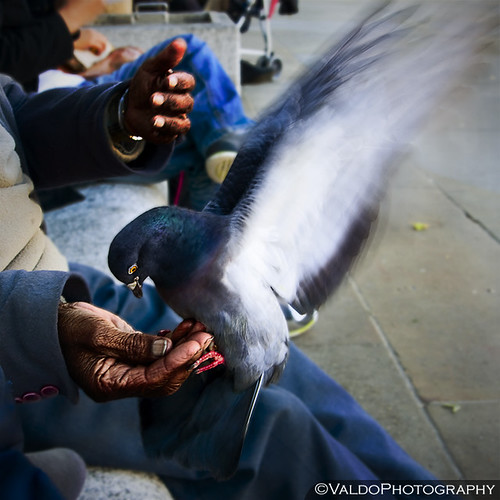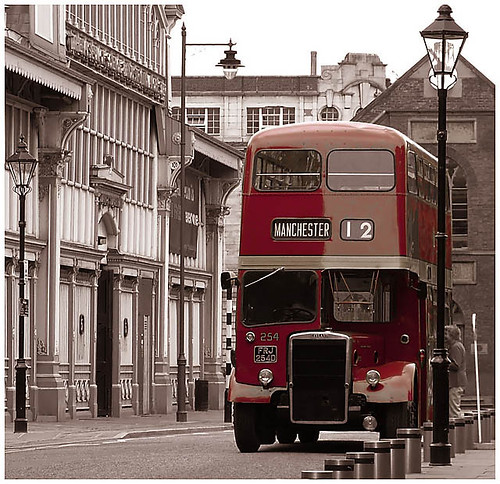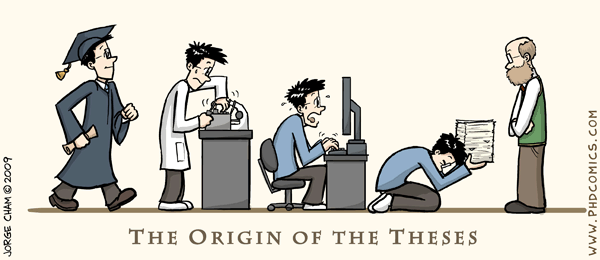"Because I want to take good pictures!"
That immediately brought to mind this comic from WTD of Aaron Johnson:

There is the common belief (or so it seems)-and not particular to photography but to any craft- that the tools make the master and that is definitely not the case (I'm not saying I'm a master BTW).
We tend to be obsessive about gear and leave the technical aspects of the craft for later (once we have got that expensive "full of bells and whistles" camera). I totally understand that because I used to think exactly the same. But now I know better: Cameras don't take good pictures!, it is you who tells the camera what it should see. Even though cameras are now very advanced micro-computers they do not have a brain to decide what is the right feel you are going after in a particular image.
 (Taken with Canon 40D 10.1mp DSLR)
(Taken with Canon 40D 10.1mp DSLR)So forget about the myth saying that "good cameras take good pictures!" I am not picking on anybody in particular here but I thought it would be a good time to explain some things about photography and its tools and this is an excellent forum to do just that. Myth-busters kinda style mind you (hence utterly uninformed rubbish). Keep reading at your own risk :D
Hit the jump for more!!
___________________
Disclaimer: I'm neither implying that I'm an expert on the subject nor that I have tried every camera in the market. Also, I don't favour or get paid to favour any particular brand over another. I talk from my own personal experience and about what I've learnt when I made myself exactly the same question. I hope this can be considered an eye opener for some of you thinking about parting from your dough for a new camera.
My mobile (cellphone) has 8 mega pixels!
Users have become obsessed with mega pixels and the companies have follow them by offering just that. More and more mega pixels contained in smaller cameras. The only thing it means is that now we have more mega pixels compressed in smaller sensors! In plain English: you can fit five people within an old beetle or in a Land Rover. Certainly your five subjects inside the beetle will end up all cramped after a couple of hours. The same happens with this new mobiles or pocket cameras the pixels are so cramped together that you are not really getting the promised resolution.
Sensor Size: just as a reference, popular compact cameras have a sensor around 0.5 cm2 (0.45 on the new Fujifilm F200EXR and 0.43 on the canon G10). In comparison a midrange DSLR like the 40D has a 3.3 cm2 and still it's pretty small when compared with an 8.64cm2 sensor of the fullframe Canon 5D MKII (same as in the Nikons' D3 and D700). You do the math, megapixels mean shit under those circumstances! there is just no comparison [Click here for more info]
Another point to take into consideration is that it all depends on what are you going to do with your images. Are you planning on plublish them in a magazine? or you only need to print the odd 6x4 and to upload to facebook or flickr? If the latter is the case then you don't have to worry about megapixels and you won't know the difference after 6MP. If you are going for quality you have to worry about the size of the sensor and the performance under low light conditions (aka high ISO performance).
I want the perfect camera! small, fast, great under low-light conditions and with a lens that covers from wide-angle to super zoom (10x)
err... if you really find something like that let me know. I'd like to marry that thing. Oh sorry, I am married already! in any case what I am trying to say is that there is no such thing!!
Lets say there are three groups of cameras each of them with pros and cons. The first group includes the "Point and Shoot" cameras, the second the "Compact Cameras" and the third comprises the "DSLRs" or the big chunky ones. You have to decide which one is the best for you according to some questions I'll write at the end of this post.
The point and shoot (PS) cameras are the very little ones, pocket size that you can take everywhere! as their name implies these are very easy to use because of their automatic settings. If you are looking for memories, this is the group for you. Because you will take the camera everywhere (until you lose it), and these days they come with good video capabilities. Sadly you will get tons of those party pics where everyone seems to be close to dying ;¬) and no matter how much they promise you their little flashes are super intelligent, let's accept it: they suck. Pros: the small size and lightness, images good for web display and the odd small print, huge amount of megapixels to boot. Cons: no manual controls, limited zoom (around 3x), very small sensors, normally not very good at night. Not a creative solution per se but remember you can be creative with anything, even with your iphone camera. I don't know much about this group but if possible try it at the store before buying and ask about shutter lag (that is the time between pressing the button and the thing actually taking the picture) and flash recycle times (I believe that cameras with dedicated batteries are faster than AA batteries cameras).
The "Compact Cameras" sometimes they actually look like small SLRs and bring manual settings to the table. That is, you can change the values for aperture and speed manually. It is normally done either by accessing the menus of through combinations of keys. Not very straight forward but the option is there. If you have previously own a PS and noticed that many of your pictures came out pretty flat, good news! it's not your fault it's the camera's. They are programmed so that they could do fairly regular under most conditions and sometimes "properly" (according to the camera) exposed pictures are flat and colourless. If you want your pics to be vibrant try under-exposing them just a little bit. That's when the manual settings come in handy!
In addition have you noticed that when the background is bright either your subject looks too dark with a nice background or your subject looks ok with a totally white background (we call it burned)? Or that when you take a picture of your friends in a museum they look ok but the background goes pitch black? well that is what the cameras are told to do straight from the factory! with the manual settings and the flash you can even things out (I will post a tutorial some other time). Believe me, having at least some manual settings give your creativity wings. Now, Pros: better optics, bigger sensors compared to PSs, more zoom (10x or so), manual settings. Cons: fixed lens, they start getting bigger, slow shutter lag compared to DSLRs, it takes sometime to get ready (moving that long lens is time consuming when you turn them on), bad high ISO performance (there are always exceptions). Tips: look for one with a hotshoe (promise to post a glossary soon), it will let you put a professional flash or control another flash if you ever have the need. A camera I've used and I'd recommend is either and old Canon G9 or the new G10. This camera is still small and packs very good optics as well as image stabilization. Having said that, I took the picture below with a Fujifilm S-5000 very old for today's standards but I was very happy with it. I sold it only to buy my first DSLR.
 (Taken with compact camera Fujifilm-S5000, 3.1mp compact camera)
(Taken with compact camera Fujifilm-S5000, 3.1mp compact camera)And the last group, the DSLR for Digigal Single Lens Reflex, remember the old Reflex cameras you maybe shoot with film at some point? well these are their digital equivalent. You have total manual control as well as fully automatic modes. The lenses are interchangeable which means now you have to pack much more if you want to get the same focal length as with PSs or Compact cameras. The benefits? better optics (depending on the lenses you buy), very short shutter lags and recovery times, more frames per second, very good focusing systems and good high ISO performance. I don't regret moving to this last group but I have to say that my wife complains that I am not taking as many family pictures. It is just too cumbersome to carry the equipment everywhere so if you go this road keep your old PS just in case you need to keep a memory and not a piece of art every now and then ;¬)
In sum, you have a huge array of products that cater for all needs, you only have to figure out what are your needs!! For that you need to ask yourself some questions:
How often do you want to use the camera?
How much are you willing to carry with you?
What kind of photography do you like? street, buildings, portraits, sports, etc.
How close will your subject be?
Will you be willing to swap lenses and consider the extra weight that implies?
Are your subjects fast moving (like kids, pets, footballers)?
How much do you want to spend?
Take a moment to answer those question and you will learn a lot about why you want a new camera. If you want to free your creativity without concern about the heavy lifting then go DSLR. If you want an all round good performer but without the weight and burden of changing lenses and shutter lag and low light performance is not a must then go Compact. If you can't be bothered and are sure that you won't take any fancy camera out for a spin then just get a PS or your mobile will do.
If you want to compare cameras and read reviews try this site (Digital Photography Review) and if you have more questions send me a line and I will be happy to help.
Back to PhD mode...




Nice post! Will be waiting for the other posts/tutorials!
ReplyDeleteCanon PowerShot G9 for the win! The best option for the gentleman who wants to have fun but avoid commitment. Sorry wrong ad...
ReplyDeleteGood post, by the way.
Adore tu post.
ReplyDeleteMe gusta la fotografía, pero no tengo "talento natural". Como en todo, voy a aprender las técnicas conocidas. Hace un año le hice la mismo pregunta a mi "mejor amigo fotógrafo" y la respuesta fue una marca: Canon. La verdad yo si creo que hay diferencia entre las cámaras... Pero la moraleja que saque del post fue que hay que aprender a usarla. Asi que me bajé el manual y he hecho descubrimientos interesantes, mi cámara es muy buena!!!
Mil gracias por la inspiración, esperamos los otros posts,
Saludos!!
Areli! que bueno que te gusto el post. Toda camara es buena si te permite realizar tu objetivo. Canon es definitivamente una buena opcion ;¬)
ReplyDeleteYa estoy trabajando en los post siguientes pero he estado algo ocupado con otras cosas. More to come...